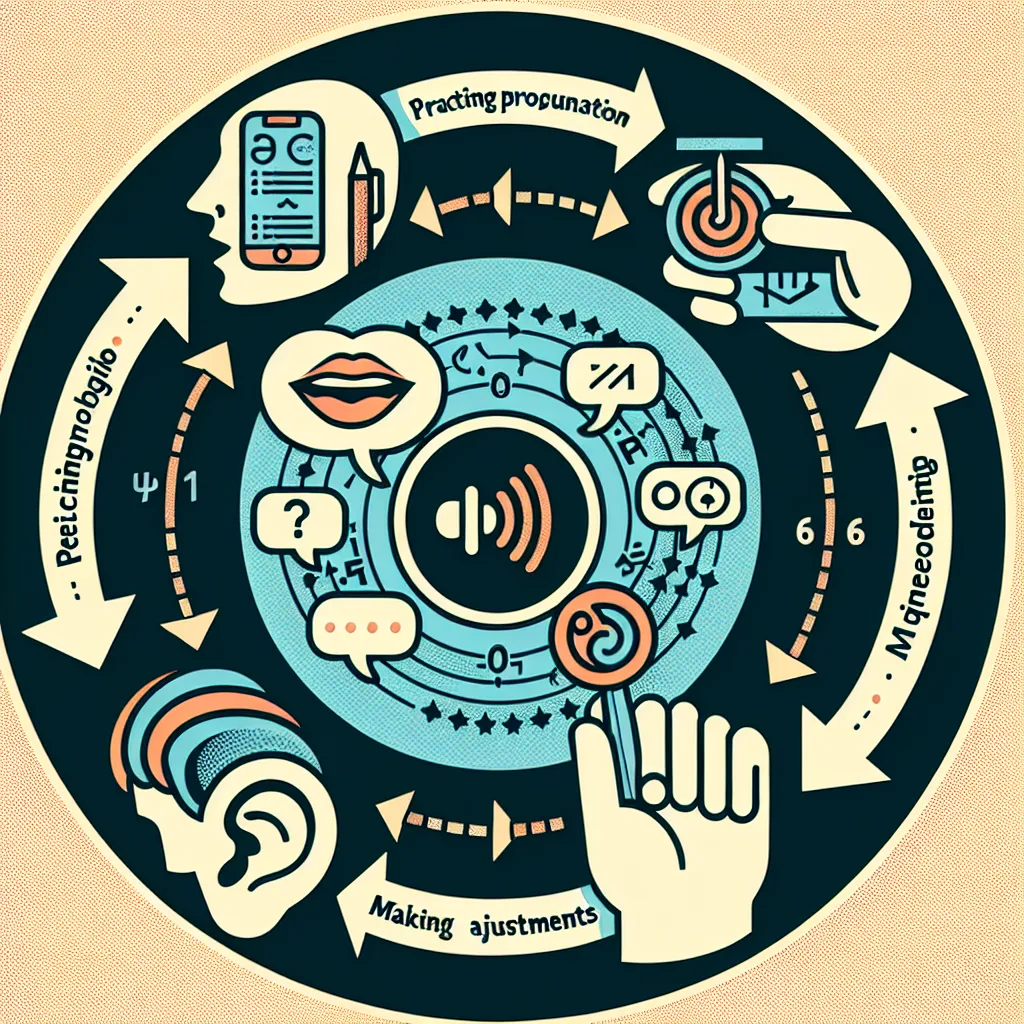Are you struggling to sound like a native English speaker? Do you want to improve your pronunciation and speak English more naturally? You’re not alone. Many language learners face this challenge, but with the right techniques and practice, you can significantly enhance your English pronunciation. In this comprehensive guide, we’ll explore effective Pronunciation Tips For Achieving Natural English, helping you sound more fluent and confident in your speech.
Understanding the Importance of Natural Pronunciation
Before diving into specific tips, it’s crucial to understand why natural pronunciation matters. Speaking with clear, accurate pronunciation not only makes you more easily understood but also helps you feel more confident in your English skills. Moreover, native-like pronunciation can enhance your overall language proficiency and even improve your listening comprehension.
The Role of Phonetics in Natural English
Phonetics, the study of speech sounds, plays a vital role in achieving natural English pronunciation. By understanding the basic principles of English phonetics, you can more easily identify and reproduce the sounds that make up the language.
 English Phonetics Chart
English Phonetics Chart
Common Challenges in English Pronunciation
Many learners face similar challenges when it comes to English pronunciation. Some of the most common issues include:
- Difficulty with specific sounds not present in their native language
- Incorrect word stress and sentence intonation
- Mispronunciation of silent letters
- Challenges with linking words in connected speech
Understanding these common pitfalls is the first step toward overcoming them and achieving more natural English pronunciation.
Essential Pronunciation Tips for Natural English
Now, let’s explore some effective strategies to help you improve your English pronunciation and sound more like a native speaker.
1. Master the International Phonetic Alphabet (IPA)
Learning the International Phonetic Alphabet can be a game-changer for your pronunciation skills. The IPA provides a standardized way to represent the sounds of any language, including English. By familiarizing yourself with these symbols, you can:
- Accurately pronounce new words by looking them up in a dictionary
- Identify and practice specific sounds that you find challenging
- Understand the subtle differences between similar sounds in English
To get started with the IPA, focus on the symbols used for English sounds and practice transcribing words you already know.
2. Practice Mouth Positioning and Articulation
Proper mouth positioning is crucial for producing accurate English sounds. Pay attention to:
- Lip shape and position
- Tongue placement
- Jaw movement
For example, to produce the “th” sound in words like “think” or “this,” place your tongue between your teeth and blow air out. Practice in front of a mirror to ensure you’re positioning your mouth correctly for each sound.
3. Focus on Stress and Intonation
English is a stress-timed language, meaning that stressed syllables in words and stressed words in sentences are pronounced more prominently. Mastering stress patterns can significantly improve the naturalness of your speech. Here are some tips:
- Learn the stress patterns of common word endings (e.g., -tion, -ity, -ic)
- Practice emphasizing the correct syllables in multisyllabic words
- Use sentence stress to highlight important information in your speech
Additionally, pay attention to intonation patterns in English. Rising and falling tones can change the meaning and emotion of your statements. Practice by mimicking native speakers and recording yourself for comparison.
 English Intonation Patterns
English Intonation Patterns
4. Use Minimal Pairs for Sound Discrimination
Minimal pairs are words that differ by only one sound, such as “ship” and “sheep” or “bet” and “bat.” Practicing with minimal pairs can help you:
- Identify subtle differences between similar sounds
- Improve your ability to hear and produce these sounds accurately
- Enhance your overall pronunciation and listening skills
Create lists of minimal pairs that focus on sounds you find challenging and practice them regularly.
5. Incorporate Connected Speech Techniques
Native English speakers often link words together in connected speech, which can make it challenging for learners to understand and replicate. Practice these connected speech techniques:
- Linking: Connecting the final sound of one word to the initial sound of the next (e.g., “turn off” sounds like “tur noff”)
- Elision: Omitting sounds in certain word combinations (e.g., “last night” becomes “las night”)
- Assimilation: Changing sounds to make them easier to pronounce in combination (e.g., “good boy” sounds more like “goob boy”)
By incorporating these techniques into your speech, you’ll sound more natural and fluent.
6. Listen and Imitate Native Speakers
One of the most effective ways to improve your pronunciation is by listening to and imitating native speakers. Here’s how:
- Watch English movies, TV shows, and YouTube videos with subtitles
- Listen to podcasts and audiobooks in English
- Use language exchange apps to practice with native speakers
- Record yourself speaking and compare it to native pronunciations
Pay attention to not only individual sounds but also rhythm, stress, and intonation patterns.
Common Pronunciation Errors and How to Fix Them
Let’s look at some frequent pronunciation mistakes made by English learners and how to correct them:
-
Th-sound: Many learners substitute “t” or “d” for the “th” sound. Practice placing your tongue between your teeth and blowing air out to produce this sound correctly.
-
Silent letters: Words like “knife,” “island,” and “psychology” contain silent letters. Familiarize yourself with common silent letter patterns in English.
-
Schwa sound: The schwa (ə) is the most common vowel sound in English, often appearing in unstressed syllables. Practice reducing vowels in unstressed syllables to this neutral sound.
-
Word stress: Incorrect word stress can make your speech sound unnatural. Learn the stress patterns of new words as you encounter them.
-
Vowel length: English has both long and short vowel sounds. Practice distinguishing between pairs like “ship” (short i) and “sheep” (long e).
Phonemic Chart and Commonly Mispronounced Words
Understanding the phonemic chart can greatly aid your pronunciation journey. Here’s a simplified version of the English phonemic chart:
- Vowels: /iː/, /ɪ/, /e/, /æ/, /ʌ/, /ɑː/, /ɒ/, /ɔː/, /ʊ/, /uː/, /ɜː/, /ə/
- Diphthongs: /eɪ/, /aɪ/, /ɔɪ/, /əʊ/, /aʊ/, /ɪə/, /eə/, /ʊə/
- Consonants: /p/, /b/, /t/, /d/, /k/, /g/, /f/, /v/, /θ/, /ð/, /s/, /z/, /ʃ/, /ʒ/, /h/, /tʃ/, /dʒ/, /m/, /n/, /ŋ/, /l/, /r/, /j/, /w/
Here are 10 commonly mispronounced English words along with their correct pronunciations:
- Clothes – /kləʊðz/ (not /kləʊz/)
- Comfortable – /ˈkʌmftəbl/ (not /ˈkʌmfətəbl/)
- Determine – /dɪˈtɜːmɪn/ (not /ˈdɪtəmaɪn/)
- Pronunciation – /prəˌnʌnsiˈeɪʃn/ (not /prəˌnaʊnsiˈeɪʃn/)
- Vegetable – /ˈvedʒtəbl/ (not /ˈvedʒətəbl/)
- Sixth – /sɪksθ/ (not /sɪks/)
- Wednesday – /ˈwenzdeɪ/ (not /ˈwednesdeɪ/)
- Subtle – /ˈsʌtl/ (not /ˈsʌbtl/)
- Coup – /kuː/ (not /kaʊp/)
- Brewery – /ˈbruːəri/ (not /ˈbruːwəri/)
Practice these words regularly to improve your pronunciation accuracy.
Conclusion
Achieving natural English pronunciation takes time and consistent practice, but with the right techniques and dedication, you can significantly improve your speaking skills. Remember to focus on individual sounds, stress patterns, intonation, and connected speech. Utilize resources like the IPA and phonemic charts, and don’t be afraid to record yourself and seek feedback from native speakers.
By incorporating these pronunciation tips into your language learning routine, you’ll be well on your way to sounding more natural and confident in English. Keep practicing, stay patient, and enjoy the process of refining your pronunciation skills.
For more advanced exercises to master English pronunciation, check out our article on How to Master English Pronunciation with Advanced Exercises. If you’re looking to improve your speaking speed, don’t miss our tips on Pronunciation Tips for Fast English Speaking.
We’d love to hear about your experiences with improving your English pronunciation. Share your thoughts and questions in the comments below!




